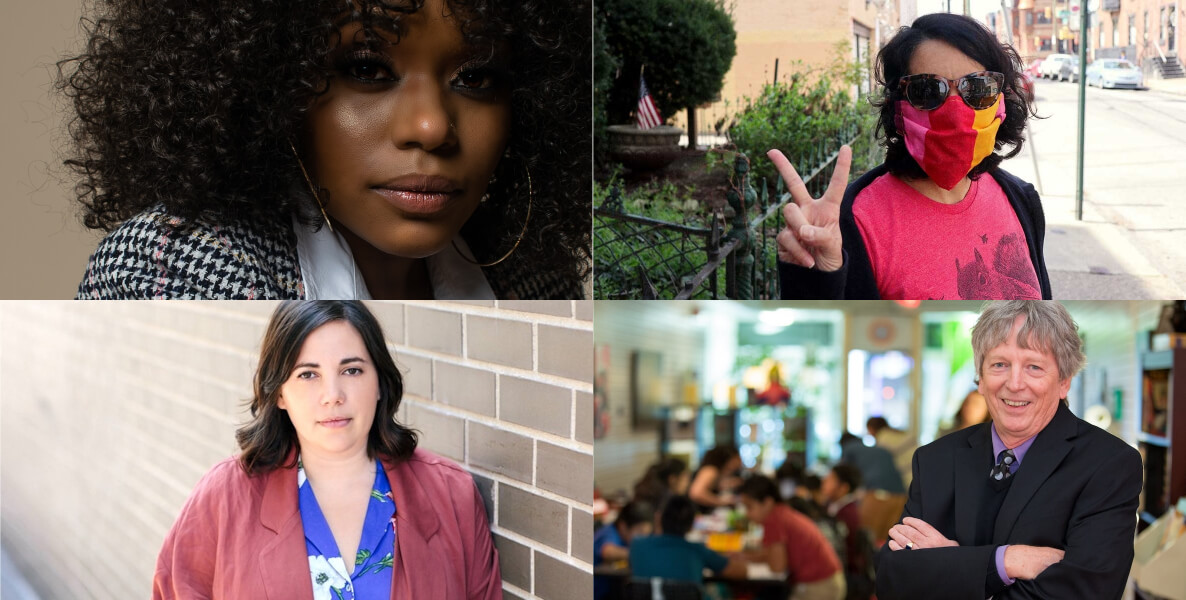It’s hard to believe we’ve been living in pandemic mode for more than a year now … or is it?
While we’re all in this crazy mess together; we’ve each experienced it in different ways. For some, the past year has flown by. For others, 2020 felt like two or three long, crazy-ass years in one. Some of us have enjoyed surprisingly positive experiences, finding new opportunities in work and relationships, and maybe learning a thing or two about ourselves that we wouldn’t know otherwise. Then there are those of us who are completely miserable, suffocating behind our masks and counting down the days till the whole thing is over so that we can get back to normal.
When the one-year anniversary of Covid hit in mid-March, we here at The Citizen asked you to share some of your thoughts about what the past year of pandemic life has meant to you. The result is the collection of short essays below, which give you a little insight into how your fellow Philadelphians have been coping over the past year.
Keep reading to hear locals—from authors to radio hosts to entrepreneurs—musing about newfound hobbies, missing family and friends, adjusting to Zoom work life and embracing fear and transformation in scary, unpredictable times.
Have something you’d like to share? Email us at [email protected].
“WE HAVE TO TAKE CARE OF ONE ANOTHER” by Jo Piazza
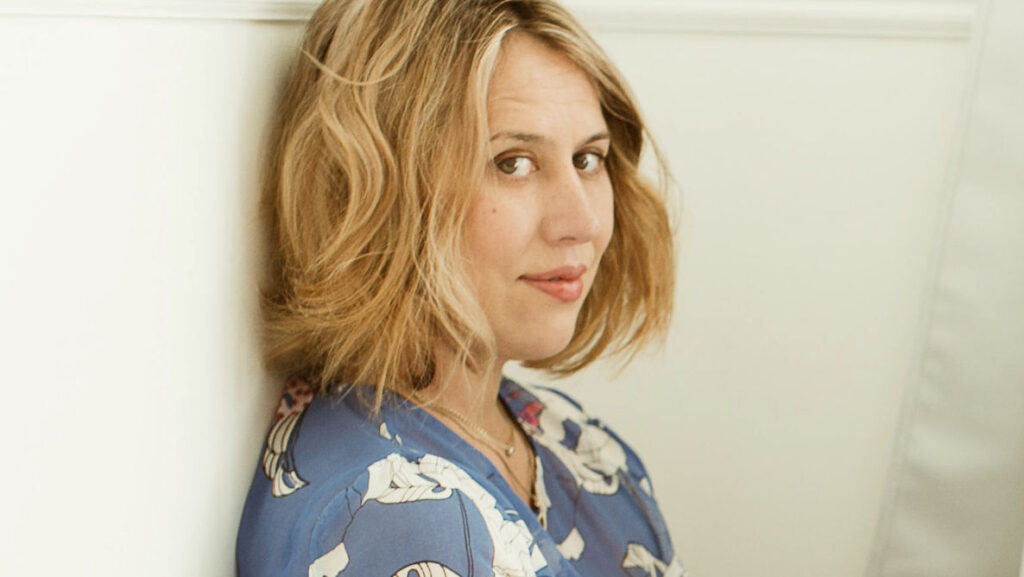
I miss strangers. I never thought I would say that because at heart I’m kind of a homebody and a secret introvert. But after a year without strangers I want them back.
The hardest part of this year was missing out on serendipitous interactions and collisions with people I never thought I would meet. How could I have known that those chance meetings were so life-sustaining, the small conversations at the park, waiting for the stoplight to change color, in line at the grocery store or waiting for a table at a crowded overpriced restaurant.
Back in the days when we could go into restaurants and sit at bars I waited in the standby line at Zahav at 4:30 in the afternoon hoping to secure a coveted seat at their bar without a reservation. I was due to give birth literally any second and I wanted my stomach to be full of delicious food when I did. My husband and I waited in line and I bitched and moaned about something to do with one of my books, as we all did back in the days when our jobs were the only thing we had to bitch and moan about.
A man behind me in line said, “Oh are you a writer?” I said yes and we got talking. He introduced himself as Reginald Betts and told us he was a writer too. In fact he was about to give a talk at the Free Library. He was down from New York and had a hankering for some Zahav. All three of us ended up sitting next to one another at the bar and trading stories. He told us his, about how he spent more than eight years in jail after a conviction at 16, how he taught himself poetry, how he ended up going to Yale and becoming an attorney and then an award-winning poet who gave talks at the Free Library. I was in awe of Betts that day. I still am. I read through a lot of his poems as I was working on our podcast with The Citizen on the gun violence epidemic plaguing our city. He stayed with me even though we met for less than an hour.
That’s what I missed the most this year. Strangers, serendipity.
But I’ve also started to think more and more throughout this year that we live in an intense culture of complaining. And that comes from social media—people feed off of each others’ complaints, and feed off of each others’ negativity. And this year was truly terrible for so many people. The people who had it the worst have been the ones who have complained the least. Now that there is a light at the end of this long tunnel I want us to think about the things we complain about and how we complain about them. Sometimes I think that our expectations that life should be excellent all the time are simply too high to begin with.
I also think that Philly needs to, once and for all, get over its self-esteem problem, and start feeling better about the wonderful things about this city. I genuinely think that Philadelphians banded together. We all tried to do the best we could. People were, for the most part, kind to one another, and empathetic, and tried to help one another.
I have friends in DC and NY and LA and I just hear horror stories about people treating each other poorly. And, yes, those things happen in Philadelphia, but for the most part, I felt taken care of—not by the city itself, because we know that our city government is one giant shit-fuck—but by other Philadelphians.
I watched other Philadelphians take care of each other, and try to support small businesses and support each other in a very beautiful way. And despite the pandemic, this remained a livable city. Of course it can be even more livable and vibrant if we borrow some of the things we learned during our pandemic year.
We have to take care of one another, all of us. That means getting out of our comfort zones and finding out what people in other neighborhoods and zip codes need and how this city can accomplish that. The pandemic hit all of us, but it hit many of us so much worse.
We have to care and we have to push our elected officials to care. I also want our city to use this opportunity to think about how we use our open spaces. What restaurants have done by spilling out into parking spaces and into the streets, and opening up more spaces for people to live and congregate and enjoy the city has been truly beautiful. I hope that our city government takes that to heart and finds a way to continue this trend, to push the boundaries between indoor and outdoor space even further.
“I MISS MY NEIGHBORHOOD” by Emma Copley Eisenberg
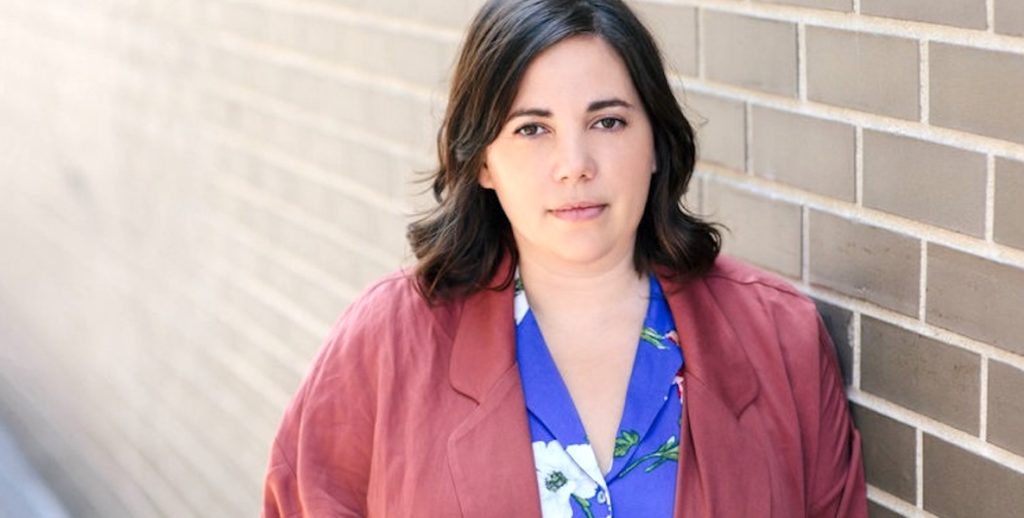
I am a social introvert, by nature. I actually do super well by myself, for vast quantities of time. I am someone who is never upset when someone cancels plans on me.
And so, at first, before we knew how bad this was, I felt this enormous sort of relief of social pressure, in a way. I love the broad kaleidoscope and fabric of human experience, but sometimes it can feel overwhelming. But because I flourish in alone-ness, I descend too easily and deeply into isolation. It’s not always easy for me to tell when I’ve maxed out on being alone, or when I’ve had too much.
I sort of depend on the pace of the world and the goodwill of others to remind me to come out of the house, and so I’ve missed a lot of connections and opportunities and ways to show up for people. So friendships are the number-one thing that I feel sad about. My community in Philly is really important to me, but I don’t know if I’ve done a great job of manifesting that love this year.
West Philly’s kind of like a shtetl, where you go out and you run into people, and then you run into the same person at a different location. I think in before-times, I might have found that exhausting, but now I really miss it. I miss my neighborhood.
But the worst part of the pandemic was that my block had a really bad fire in November, the week before Thanksgiving. No one was hurt, thankfully, but several homes were destroyed. It was really scary, and compounded by the pandemic.
It all brought more attention to how the pandemic has not affected people equally. And parts of the Black community in West Philly were subject to a lot of misinformation and unclear communication from the city around Covid. The firefighters came but then they left and it was just us, the people who lived on the block, and it was up to us to figure out how to support those who had lost their homes and had nowhere to go.
There was no safety net, no one from the broader city that stepped in or helped. It all just kind of stewed together to feel like we were alone with whatever might befall us. We did a GoFundMe, and so many people in my community and my neighbors’ communities contributed. But it was really painful to see how many of us are just one catastrophe away from catastrophe. The pandemic already was that one catastrophe for so many, and then to add this on?
One thing that has been inspiring is the shakeup in what people have been gravitating towards, in terms of their creativity. I know writers who are creating now in mediums other than what they use to make a living—writers doing sculpture, poets trying short fiction. I have been drawn to collage. It’s really nice because you can use materials from around the house—you don’t need any special supplies. And you can sort of evolve as you go—you don’t need a plan. It’s less scary for me than the blank page of writing, because there’s stuff that you can start out with, and rearrange as you go.
At Blue Stoop, we’re just trying to meet people where they are, casting a wide net of events and inviting people to come [virtually] to what feels good. It’s been a lot of trial-and-error. I do think that creativity really thrives on structure, and with other people, so we have been trying to create programs that happen frequently and at the same time each week so people always know their creative community is still there and easily accessible.
FEAR IS NOT IRRATIONAL by Roxanne Patel Shepelavy
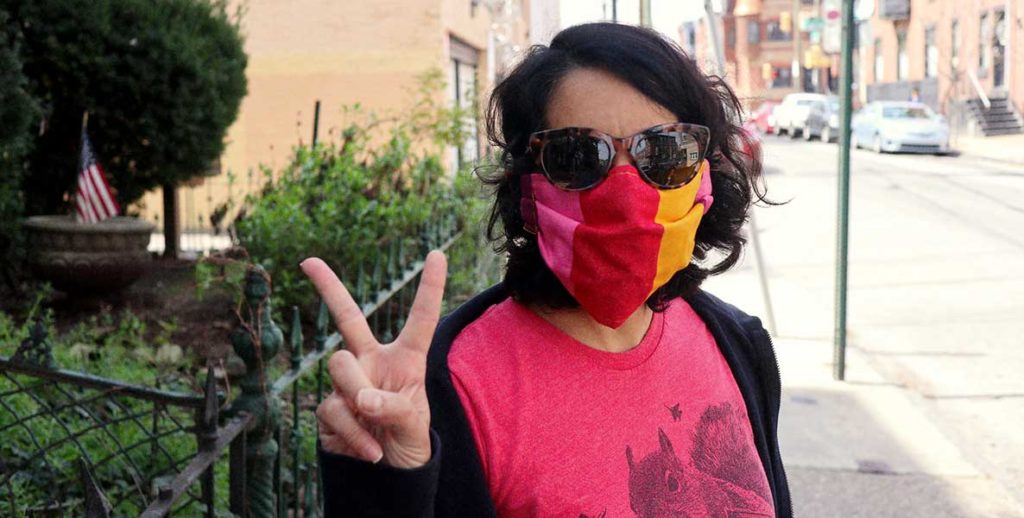
She meant to distract me, the young nurse, as she poked a needle into my hand, searching for an easy vein, while telling me excitedly about the weekend skydiving trip she took with her fiancé. They’d jumped out of a plane! It was thrilling! And then, her eyes intently on the needle she was jabbing into the next vein, she asked me: “What’s the scariest thing you’ve ever done?”
“Um,” I replied. “This.”
By this I meant brain surgery, which I had in October to remove a benign tumor from my hearing nerve (and which was the reason for the IV, in the ICU). It was, to say the least, terrifying for me, and everyone who loves me. But really, I could have been referring to all of the last 12 months, the year in which fear was the emotion I (and maybe you?) most often chased away.
It was fear of this weird ravaging virus, of course—fear that it would make my parents sick (or worse), that my children would come apart at the seams, that the vaccines would all fail, that all we lost would never come back. In the middle of that was fear, too, that my city would figuratively and literally burn to the ground, that we’d have a violent civil war, that America would be lost and never come back. That we’d never learn, never be better, never find a way to come together.
And none of those fears, even now, seem at all irrational. It’s hard sometimes even to breathe for the worry of what we’re experiencing, what we’ve become, what we’re doing to each other, not doing for each other. Are we on the other side of that? It’s hard to say so. And yet. Here we are; here I am.
Maybe—could it be?—what has won out is my natural inclination to tilt towards hope.
I’m a mother; fear is a little wrapped package that lives constantly just out of sight in the (large) part of my brain that is devoted to my children. Perhaps I’ve learned to adapt, to live with this new fear, as I live with that one. Or maybe—could it be?—what has won out is my natural inclination to tilt towards hope; maybe that is the lasting thing I’ll take away from these 12 months (and counting).
I didn’t come through this year with a profound life lesson. (Did you?) I can’t say that Covid and brain surgery and the shitshow that was 2020 have somehow left me appreciating the little things in life more than ever.
But those little things? They mattered.
There was the illuminated heart I saw every night from my bedroom during the lockdown, shining down on the city from the Comcast Tower. The story after story (after story) of people jumping in to help each other, in little and big ways. The socially distanced photos Andrea Cipriani Mecchi took to document Philly families (including mine) in this moment. The encouraging stickers that appeared every six feet on the sidewalk outside my house, where people lined up for food twice a week. The rainbows. The collective tears, the anger, the signs. The books I barreled through. The chips I ate with abandon (because if not now, then when?). The Zoom meetings that started to feel actually not weird. The Zoom happy hours with far-flung friends that meant sort of spending time with far-flung friends. The favorite restaurant down the street that actually made it through with staff intact. The sequined and message-emblazoned and silly face masks that started showing up a few months in. My Martha Rich vote mask.
I am incredibly fortunate. Most of my fears have not been realized. And I am incredibly grateful. For the brilliance of doctors (and surgeons), scientists, nurses, public health officials. For the kindness of neighbors. For the work of activists, artists, educators. For pivots, and compromises, and mail. For luck. For voters.
And, finally, for that little thing I never realized I could be so grateful for: hugging my vaccinated parents, for the first time in more than a year.
TRANSFORMATION (RE)DEFINED by Syreeta Martin
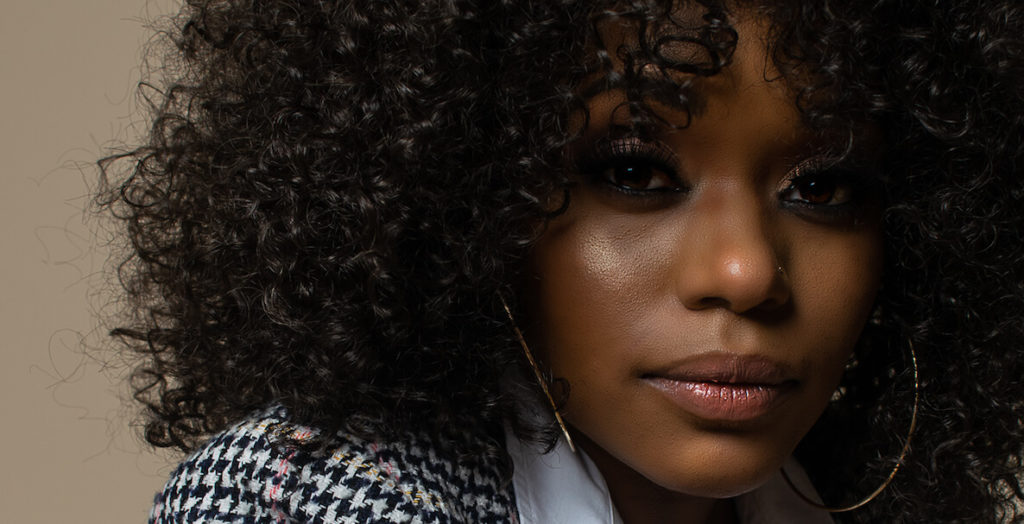
The past year was a transformative force. Anytime transformation occurs there is disruption in its onset, disorientation in its presence and, oftentimes, destruction, in its wake.
An immediate Google search of the word “transformation” delivers this top definition: a thorough or dramatic change in form or appearance.
- Does the world look and feel like it used to?
- Does your life look and feel like it used to?
- Was there anything truly left untouched in your life’s radius?
I wouldn’t ask you this without first asking myself and so:
- No.
- HELLLLL no.
- Not really.
At some point during the pandemic, I realized that nothing would likely ever be quite the same again. I lamented that thought just as much as I was intrigued by it. We’ve simultaneously experienced the disruption of systems, institutions, and ideologies; and the destruction of lives, human rights, and health. All of it, in ways both blatant and nuanced, have been disorienting.
This is why I believe transformation that results in positive progression can be traumatic (i.e. an emotional upset). More recent conversations that I’ve engaged in have focused on life post-pandemic: whether the generations who lived through it will ever feel comfortable again to be in large crowds, to live life as carefree as possible, to keep our homes stocked with a reasonable amount of toilet tissue, and to go maskless. Of course some folks will and already have, but the conversations that were held focused on the macro impact of a global traumatic event.
Despite the trauma that can come with transformation, many of us have also experienced good fortune in ways we did not anticipate. More time at home, a new work schedule or environment, an increase in income or opportunities, quality time, improved health or wellness routines, and deeper internal reflection.
I’ve personally experienced the birthing of new projects and practices. And I’m almost certain that us having to stay in doors for a sustained amount of time provided mother nature with a break—a chance to breathe and heal. (Because let’s be honest, humans are messy and harmful AF to her.)
When originally approached about this piece, I was asked to essentially reflect on 365 days in 500 words or less. Here are four takeaways from my life over the past year.
Family: There’s more than one way to get something done; learn folks’ strengths and delegate accordingly as you manage YOUR expectations and triggers.
Finances: Don’t feel guilty about having abundance during widespread lack. Instead, use that energy to practice gratitude and seize the opportunity to help as much as you can.
Fitness: As Big Sean would say, work harder than your demons. I would add that you should anticipate the very real likelihood that they’ll work harder too. Don’t go it alone if you don’t have to and don’t be ashamed of anything.
Faith: While life may be bigger than you, don’t underestimate or minimize the role of your life in the bigger picture (YOU MATTER).
I wrote this piece to say: This year was indeed a transformative force…and so are you. So are we. How we come out of this year—this pandemic—is equally, if not more, important as how we went into it.
The question is: When we emerge from this pandemic, how will we have transformed ourselves and our world…for the better?
“IT REALLY ISN’T SO BAD. CONSIDERING” by Tim Whitaker
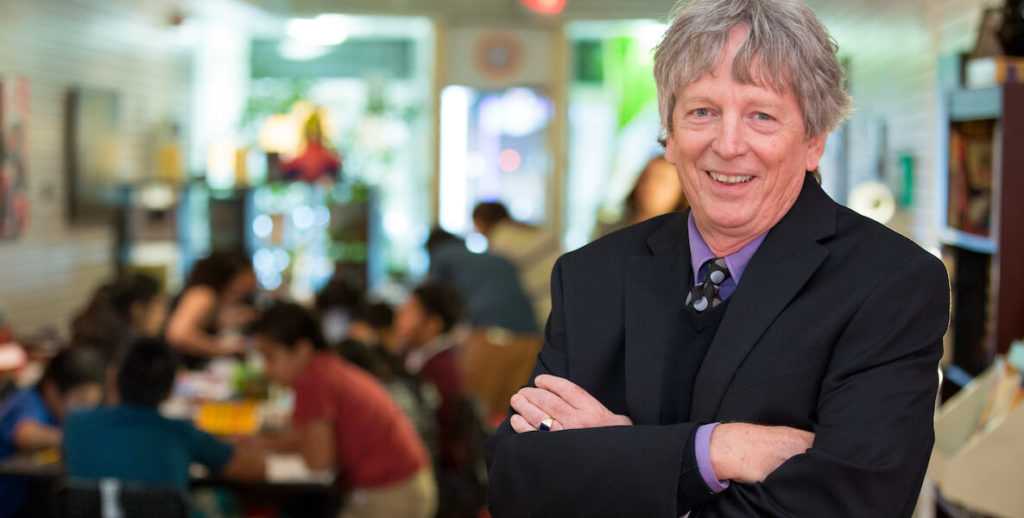
Mighty Writers, the nonprofit where I serve as executive director, was on quite the roll when Covid hit.
Our “think clearly, write with clarity” mantra had taken hold. We had five writing centers for kids going strong in the city. We had established ourselves in Camden, NJ, and we were teaching literacy skills to the children of farmworkers in southern Chester County.
We were also making weekly trips to Atlantic City with the intention of opening a writing center there and convincing the casinos that a city of bright and literate kids would be good for business. Soon after, we’d look at Trenton, then Newark, then New York City. We were feeling the Mighty.
What’s the old Yiddish expression? Make plans, God laughs?
Come Covid, we shut everything down and immediately made all our writing workshops virtual. Because our centers are embedded in the communities we serve, we saw how families were coping with the onslaught of the pandemic.The short answer, in most cases: not so great. And, most often, worse than that. Jobs were being lost, schools and daycare centers had closed, kids were home and needed to be watched. How was that supposed to work? Both the short and long term future was looking increasingly ominous. Help was needed.
We stepped in, best we could, reorganized our staff, began distributing food, then diapers, masks, wipes, books—always books—at all our centers every day. Food distribution was suddenly a major part of our operation. It still is, and will likely remain that way for some time. We feel good that we’ve been able to be a help to our communities—considering, because if you don’t include the “considering” qualifier into every positive story you tell in the time of Covid you’re just not speaking truth.
“Being back in person, as the phrase goes, even on a rationed basis, will surely be a wonder. In our case, it’s the chance to see Mighty Writers kids in the flesh again; to hear them laugh, tell their tall tales, write what they feel and be their naughty by nature selves.”
But now that there appears daylight for a future that will at least echo what went before, it feels safe to begin to acknowledge, even with all the darkness, the good that has come from our virtual work environment. In my case, and in the case of Mighty Writers as an organization, there has been much good in virtual life.
Considering.
For starters, we learned to collaborate and strategize; to listen to each other; to mull, singularly, together, and mostly wisely. We got smart about streaming, and realized it was going to be an integral part of our future. Our full schedule of Zoom meetings with staffers and multiple partners has had occasional disorienting impacts, like those moments, speaking only for myself here, when I would lose myself in the computer screen—What’s the topic? Who are these people? Why am I here?
In those times, I would break free of Zoom, jump in the car and drive, mostly aimlessly, but always somehow riding past closed basketball courts, once my lifeline to exercise, where I’d stare mournfully at the rimless backboards. I would try to find solace in the Billie Holiday and Junior Walker playlists that lived on my phone.
Mostly, though, periodic breakdowns aside, Zoom life has kept me, much as it feels weird to say it, connected. It has drawn me closer to people I work with, some of whom in our previous states I saw not nearly enough and then only on the fly. In Zoom meetings, I got to see faces close up, and at all times of day. I learned people’s biorhythms, what made specific colleagues laugh, and learned what they did to feel restored. I could see when exhaustion was taking its toll and learned to bring the temperature down and try hard to stay supportive in those moments. After all, we’d been growing a business together day by day, hour by hour, while taking this dark, bleak journey together. Respect for that need be paid.
Being back in person, as the phrase goes, even on a rationed basis, will surely be a wonder. In our case, it’s the chance to see Mighty Writers kids in the flesh again; to hear them laugh, tell their tall tales, write what they feel and be their naughty by nature selves. It will remind us why we believe so deeply in teaching and promoting the power of the written word. In the meantime, we’ll be keeping the Mighty alive virtually. It really isn’t so bad, considering.
PHILADELPHIA, I MISS YOUR FACE by Maureen Gallagher Boland
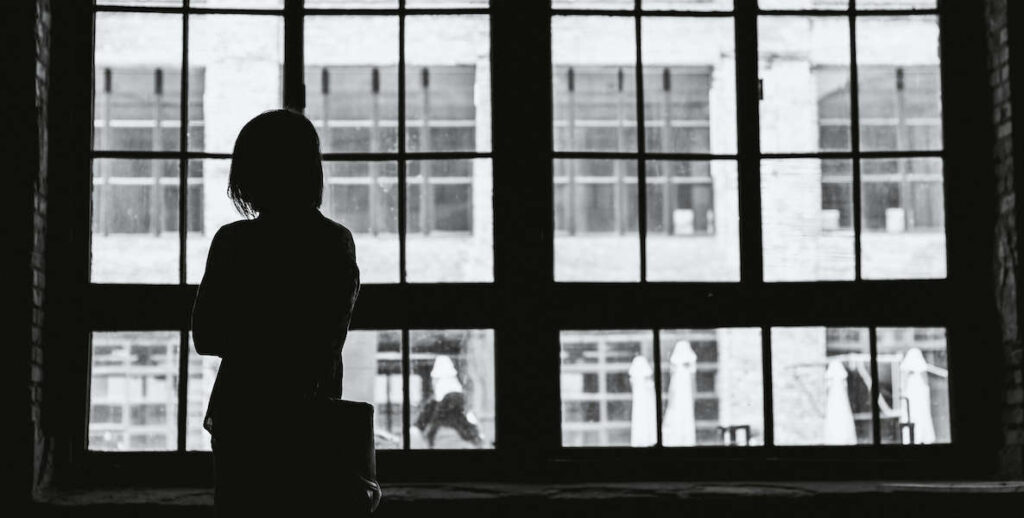
Curled up in bed on Christmas night, I try to name this feeling. It’s the letdown of diner coffee that promises to be rich and hot but proves lukewarm and weak. It’s a staticky radio signal.
We gathered on my brother’s porch today. Right away, the kids ran for the backyard where they were, no doubt, violating the rules of touch, wrestling, picking up the littlest ones.
I moved from corner to corner, trying to catch up with my brothers and their wives from six feet away. In the hour we were there, the temperature dropped and the fire pit produced more and more ash.
Only my mom and the babies were maskless. I made a big deal out of it. She kept saying her glasses fog up as if she is the only human who is wearing glasses during the pandemic.
I was at the grocery store on Ridge Avenue not long ago. I heard the familiar voice of the 60-something lady who watches over the self-checkout line. She was jolly, but not just because it’s Christmastime. She was jolly in the spring and in the summer too. She’s probably the type that thinks she’s responsible for lifting the mood of the world.
I am that type too. I am the jolly Zoom teacher, staring at a screen of names with no faces trying to make up for all that my ninth graders are missing, playing happy music, telling stupid jokes, cuddling my dogs on camera.
For me, it’s not about teaching imagery or composition now. It’s about making sure kids want to show up to class. I don’t want to lose anyone. Ninth graders are prone to dropping out in normal times. We have already lost a few this year.
It’s not just on Zoom that I can act like I am responsible for the mood of the world. With similar silliness, I try to fill in all of the gaps left by the pandemic for my daughters. It can be exhausting.
And so it really resonated with me when the jolly checkout lady started laughing uproariously. I could hear her muffled, yet discernibly scratchy voice from the other side of the store, letting all of her shoppers know that the cutest baby she had seen all day had just given her a big smile.
She spends her days with a giant smile behind her mask trying to spread it up into her eyes for her shoppers, but the only chance for a return on her investment is with the babies, and I’ve noticed most of them don’t know what to make of our masked-up faces either.
It’s not just your face that I miss, Philadelphia. It’s your smell. To the gentleman who drives the K bus—I miss the fresh smell of your cologne mixed with the exhaust fumes as I walk by your idling bus. You pace, talking on a phone. I pass by with my dogs, and I can’t smell you, and I can’t see if you are happy or sad. We used to make eye contact. We used to share a nod. But we’ve kind of given up on all of that, haven’t we?
I miss the winter smell of my crowded classroom—wet socks, hot radiator, unwashed coats. I miss the custodian’s vanilla perfume and the confident slip-slap of my principal’s heels. I miss Spring Garden Street during my prep, fried eggs mixed with cigarettes.
I miss the ability to coax a smile from a kid whom I’ve asked to stay after class because I noticed a change in her posture and the way she’s staring out the window.
I miss the way I will sometimes connect with a stranger so much that one of us might touch the other’s arm.
I miss not feeling nervous when my kids are wrestling with their cousins, or when my mom won’t keep her mask up. I miss the smell of my mom. I miss noticing the way my dad’s mouth quivers when he feels anything a little too deeply.
Curled up in my bed on Christmas night, I bury my face in Tom’s warm neck, asking him to hold me for longer than usual, wanting his skin and breath to heal my sensory deprivation.
I thank God for him and for this warm bed. I pray for all of the humans, especially those in hospitals, who are trying to heal and be healed through the muffle of the masks. I pray for all of those who are mourning or dying without the touch and smell of those they love.
I imagine the fresh breath of spring and the bursts of flowers and faces that await us.
Have some musings you’d like to share? Email us at [email protected]


